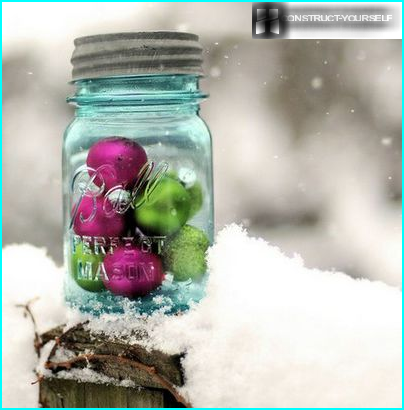
Water pump – the main element of the water supply systems, irrigation, irrigation. From its functionality depends on the work of the whole system. If the device is initially picked up incorrectly, not enough power or the design of the device is not suitable for functions, then failures are inevitable. In this case, you will either have to purchase additional devices to compensate for the lack of, or change the model itself. To choose the right water pump for water for home, cottage or garden, you need to take into account structural features, working principle, purpose and technical characteristics of water-lifting equipment.
The contents
The General principles of the device pumps
Each pump type has its own structural features, but the General principle of operation in pumping devices one. When you turn the motor inside the housing, a vacuum is created. Due to the low pressure water is sucked into the vacuum chamber, is moved to the output pipe and is pushed through the hose or tubing. Force «extruding» water determines the pressure in the system. It should be high enough to overcome the hydraulic resistance.
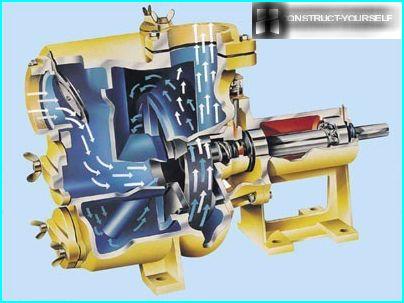
All pumps work on the principle of drawing water through the inlet and discharge through the outlet, only different in the method of creating a vacuum
The design of the pumps can vary significantly depending on which method a vacuum is generated in the device, according to this feature the pumps are divided into:
- centrifugal;
- vortex;
- vibration (second name – electromagnetic).
Depending on the location of the pump relative to the water tank there are superficial and submersible model. Design and functionality of the device is divided into wells, pumps, drainage, pumps. A more detailed explanation of this in the video below:
Centrifugal pump is a universal equipment
Devices of this type are used in almost all spheres of both production and household. The principle of operation is based on creating a inside the housing of the centrifugal force, due to which the movement of the water creates pressure. The blades and wheels of the working part rotates, tighten the liquid pressed to the wall, then push in the hole. Depending on the design and destination devices are divided into a plurality of groups. They can be superficial and submersible, cantilever, horizontal, vertical, close-coupled, single and multistage.
All components are made of high-strength materials, details virtually no wear. It is assumed that the pumps will work continuously. Therefore, they are designed so that the service was simple and fast. The device can operate at high temperatures and in chemically aggressive environments, the characteristics depend on the characteristics of a particular model. Some of them can withstand up to 350 degrees.
The advantages of centrifugal pumps include reliability, durability, reliability, reasonable price, the possibility of equipping the necessary automation, high efficiency. However, like any other devices, pumps of this type have their own disadvantages. So, to start the appliance casing must be filled with water because of small centrifugal force, the water is not absorbed in the nozzle. In contact with air in the inlet pipe the pump can stop. In addition, if the resistance in the grid changes, this may affect the stability of the device.
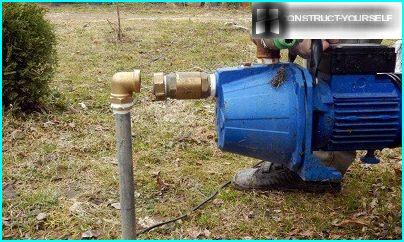
Surface centrifugal pumps are mobile, easily dismantled and transported, but for a permanent installation are not
Widespread cantilever centrifugal pumps. They are used for pumping clean and dirty water containing impurities and small debris. For water supply systems of houses and cottages used horizontal cantilever single-stage pumps. Multistage horizontal pumps are designed working the same as multiple, series connected, single-stage devices. Because of this they are able to provide a powerful pressure in the system.
Centrifugal water pumps acquire for the home, garden watering system and irrigation. They are installed in the water supply systems operated wells. Use of submersible and semi-submersible model. The first is easier to install, and the second service. For the installation of semi-submersible model in the well need special conditions. This time-consuming work, therefore, despite obvious advantages, the owners of private houses more often stop the choice on submersible models. They can be mounted in wells, where with the installation of the casing were deviations from the vertical. The disadvantages include high sensitivity to sand and dirt.
Provide an overview of centrifugal monoblock water pumps that are perfect for garden:
Features of vortex-type structures
The device works due to the vortex wheel, which is a metal disk with blades that create a centrifugal force. The structural features of the water spins in a spiral, shaped like a whirlwind. The main advantage of the pump of the vortex type is a powerful pressure. At equal centrifugal pump dimensions, weight, wheel sizes and the number of rotations a vortex makes for a more strong pressure. Therefore, the size of the housing of the vortex model can be substantially less than the centrifugal.
Due to the high pressure developed vortex pumps, they are successfully used for watering gardens, orchards. They are perfect for installation in water supply systems of villas and private houses, if there is a need to increase pressure in the network. Unlike centrifugal models, vortex can handle getting into the tubing large air bubbles. The compact dimensions expand the scope of application of pumps of this type. Of the drawbacks – sensitivity to suspended particles in the water. If a lot of them, the pump will work intermittently and it will quickly become worthless.
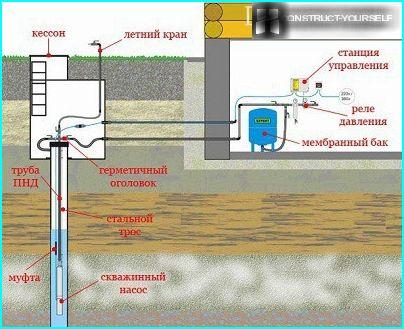
Thanks to its compact size and high power vortex pumps are well suited for installation in deep wells of small diameter
Vibration pumps for home and garden
For home, cottage and garden, you can choose the electric water pump of the vibrating type. The principle of operation is based on electromagnetic field generated by the coil which pulls the metal core with a flexible diaphragm. Curving, rubber diaphragm creates a low pressure, whereby water is drawn into the hydraulic chamber. When the diaphragm returns to the place pressure rises and actuates the valve overlapping the inlet, so the water is pushed through the outlet. The constant movement of the diaphragm ensures trouble-free pumping of water.
The pumps are vibrating type used for watering and irrigation of plants. They are installed in systems of Autonomous water supply. A huge advantage of this design is the ability to pump contaminated water to be applied at the pumping wells and wells for routine cleaning. When working with dirty water the vibration performance of the pumps drops significantly, however, they may well cope with the cleaning of the bottom of hydraulic structures. Another advantage of the construction – relatively low cost and reliability. The durability of the device provided with the design in which there are no moving, rubbing parts.
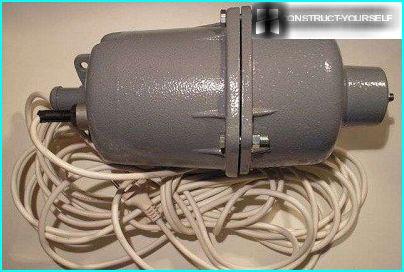
If the borehole diameter is relatively large, it is possible to set vibration pump, pre-putting him on a rubber ring for «jamming» vibration
The disadvantages of electric vibratory pumps are not less than merit. In the operation of the devices often causes problems in the case of voltage drops in the mains. If the home owner decides to install a vibration pump, you will also have to purchase a voltage stabilizer. These pumps are successfully used for pumping water from wells, but they do not want to install in the bore, especially small diameter, despite the ease of installation. The constant vibration affects the design of the casing, and sooner or later the pump will either break itself, or destroy the operational pipe.
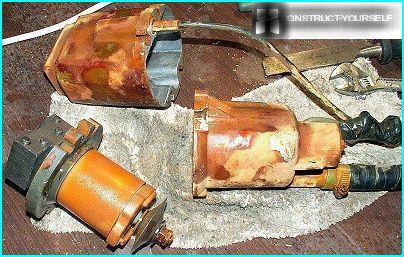
Pump «Brook» it is undesirable to mount in a narrow casing. This can result in unplanned pump repair or even drilling a new well
The use of surface and submersible pumps
All lifting equipment can be divided into surface and submersible. The pumps of the first type installed outside hydraulic structures or reservoirs from which the water withdrawal is carried out. The second dipped into the water. Designs vary in performance, type and location of the input connections, the permissible conditions of installation. Surface models are generally cheaper and capable of working, if the height of the water layer below 80 cm Submersible pumps must operate at a depth of not less than 1 m below the water surface.
The surface model is a good choice for irrigation
Surface water pump for garden or garden – perfect if you need to organize watering of a natural waterbody or volume of the tank. If necessary, it is easy to remove and relocate, storing. It is well suited for cottages. Such a pump can be installed for collecting water from a well or shallow borehole (up to 9 m), Abyssinian well. In this case, the owner will not have to pick up the device diameter, because the well is lowered only to the hose, and the pump installed near the operating pipe.
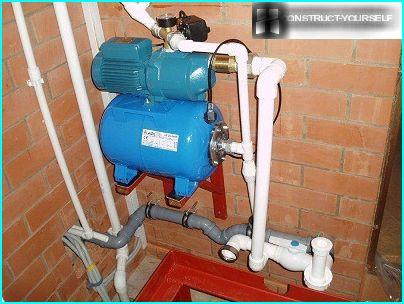
Pumping stations refer to surface water lifting equipment. They represent a multifunctional system combining a pump and an accumulator
The only caveat to the mounting surface of the model need to prepare the area where the device will be protected from moisture, and noise from its operation will not interfere with anyone. Set the device either on the ground or on a special floating platform, if you have to take water from the public source. When installed in an improperly closed pit bottom is poured concrete and filled with gravel. Bulk materials absorb excess moisture, which can occur when water seepage through the joints of concrete rings or brick masonry.
When calculating the necessary capacity you need to remember that the ratio of length vertical and horizontal is 1:4, i.e. 1 m of vertical pipe is considered as 4 m horizontal. For water companies it is better to use plastic pipes instead of rubber hoses. During pumping of fluid by flexible hoses they can be compressed and bent from the pressure. Water will not normally pass through a narrow aperture, which will lead to shortages.
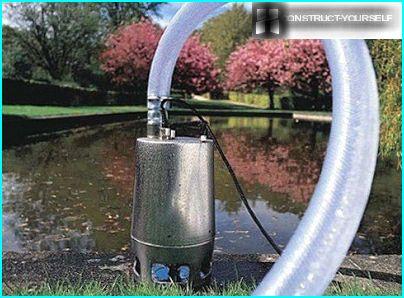
Using surface equipment is easy to organize watering plants from the pond. To do this, the choice of model must take into account that water will flow with particles of dirt and sand
Submersible equipment for house water supply
The best water pump for home or Villa, where there are long — submersible. It is well suited if you plan the installation of water supply system from deep wells (more than 9-10 m). Normal household model raises water from a well to a depth of 40 m and for the deeper structures can you find a more powerful device. With the selection of pumps for wells up to 80 meters rarely have problems, because of the extensive range. All submersible models are supplied with automatic protection «dry run».
To install a submersible pump can, if he doesn’t touch the bottom, and the height of the water layer over it will be at least 1 m. This is necessary for several reasons. First, that the engine is properly cooled, there must be a sufficient amount of water. Second, the water level in the well or the well is not stable. It may change depending on the season. It is important that the pump was not too close to the water, otherwise you may have difficulties with water supply. The pump should reach the bottom at 2-6 m below the dirt and grit from the bottom did not fall in the inlet pipe.
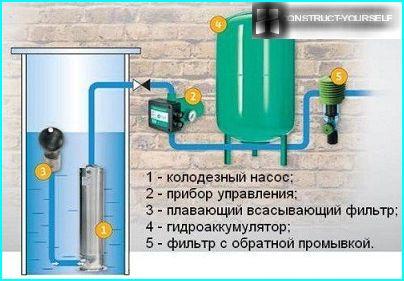
A distinctive feature of the drain pump – ability to pump both clean water and dirty with solids. Inlet pipe of this pump is provided by the grid. The device can be connected to the water supply
A brief video tutorial on pump selection
Choosing an electric water pump for home, cottage or garden, first consider its purpose. Perfect equipment «for all» does not exist. Consider which main tasks will be to perform the device, will it work only for pumping clean water or there is a possibility that he will have to raise water with sand and mud.
When choosing a particular model be sure to consider the most important technical parameters: power, performance, efficiency, maximum pressure. If the calculations have doubts they are correct, consult with a specialist. As for brands of household water pumps, well proven brands Wilo, DAB, «Dzhileks», «Belamos». The market leader is brand Grundfos.






